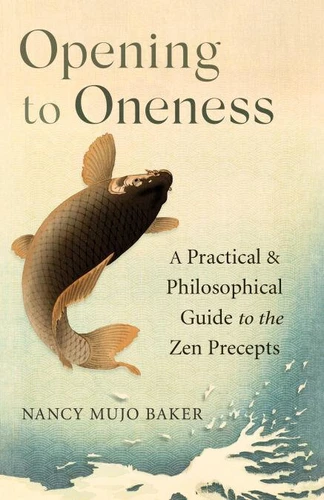Opening to Oneness. A Practical and Philosophical Guide to the Zen Precepts
Par :Formats :
Disponible dans votre compte client Decitre ou Furet du Nord dès validation de votre commande. Le format ePub protégé est :
- Compatible avec une lecture sur My Vivlio (smartphone, tablette, ordinateur)
- Compatible avec une lecture sur liseuses Vivlio
- Pour les liseuses autres que Vivlio, vous devez utiliser le logiciel Adobe Digital Edition. Non compatible avec la lecture sur les liseuses Kindle, Remarkable et Sony
- Non compatible avec un achat hors France métropolitaine
 , qui est-ce ?
, qui est-ce ?Notre partenaire de plateforme de lecture numérique où vous retrouverez l'ensemble de vos ebooks gratuitement
Pour en savoir plus sur nos ebooks, consultez notre aide en ligne ici
- Nombre de pages176
- FormatePub
- ISBN978-0-8348-4473-5
- EAN9780834844735
- Date de parution24/01/2023
- Protection num.Adobe DRM
- Taille4 Mo
- Infos supplémentairesepub
- ÉditeurShambhala
Résumé
Stop trying to become "better" by suppressing or hiding parts of yourself, and learn what it means to be fully human with this accessible guide to the core ethical teachings of Zen Buddhism. In Opening to Oneness, Zen teacher Nancy Baker offers a detailed path of practice for Zen students planning to take the precepts and for anyone, Buddhist or non-Buddhist, interested in deepening their personal study of ethical living.
She reveals that there are three levels of each precept: a literal level (don't kill, not even a bug), a relative level that takes moral ambiguity into account (what if it's a malaria-spreading mosquito?), and an ultimate level-the paradoxical level of nonduality, in which the precepts are naturally expressed from a state of oneness. Full of nuance, intelligence, and compassion, the first half of the book addresses the ten grave precepts mostly from the relative level, including instructions for how to practice these precepts individually and in pairs or groups.
The second half of the book takes a deep dive into looking at the precepts from the ultimate perspective, largely through an exploration of the writings of Dogen, the thirteenth-century religious genius who founded the Soto Zen school. At once comprehensive and innovative, Opening to Oneness will take its place alongside classics like The Mind of Clover, The Heart of Being, and Being Upright as a cherished guide to Zen Buddhist ethics.
She reveals that there are three levels of each precept: a literal level (don't kill, not even a bug), a relative level that takes moral ambiguity into account (what if it's a malaria-spreading mosquito?), and an ultimate level-the paradoxical level of nonduality, in which the precepts are naturally expressed from a state of oneness. Full of nuance, intelligence, and compassion, the first half of the book addresses the ten grave precepts mostly from the relative level, including instructions for how to practice these precepts individually and in pairs or groups.
The second half of the book takes a deep dive into looking at the precepts from the ultimate perspective, largely through an exploration of the writings of Dogen, the thirteenth-century religious genius who founded the Soto Zen school. At once comprehensive and innovative, Opening to Oneness will take its place alongside classics like The Mind of Clover, The Heart of Being, and Being Upright as a cherished guide to Zen Buddhist ethics.
Stop trying to become "better" by suppressing or hiding parts of yourself, and learn what it means to be fully human with this accessible guide to the core ethical teachings of Zen Buddhism. In Opening to Oneness, Zen teacher Nancy Baker offers a detailed path of practice for Zen students planning to take the precepts and for anyone, Buddhist or non-Buddhist, interested in deepening their personal study of ethical living.
She reveals that there are three levels of each precept: a literal level (don't kill, not even a bug), a relative level that takes moral ambiguity into account (what if it's a malaria-spreading mosquito?), and an ultimate level-the paradoxical level of nonduality, in which the precepts are naturally expressed from a state of oneness. Full of nuance, intelligence, and compassion, the first half of the book addresses the ten grave precepts mostly from the relative level, including instructions for how to practice these precepts individually and in pairs or groups.
The second half of the book takes a deep dive into looking at the precepts from the ultimate perspective, largely through an exploration of the writings of Dogen, the thirteenth-century religious genius who founded the Soto Zen school. At once comprehensive and innovative, Opening to Oneness will take its place alongside classics like The Mind of Clover, The Heart of Being, and Being Upright as a cherished guide to Zen Buddhist ethics.
She reveals that there are three levels of each precept: a literal level (don't kill, not even a bug), a relative level that takes moral ambiguity into account (what if it's a malaria-spreading mosquito?), and an ultimate level-the paradoxical level of nonduality, in which the precepts are naturally expressed from a state of oneness. Full of nuance, intelligence, and compassion, the first half of the book addresses the ten grave precepts mostly from the relative level, including instructions for how to practice these precepts individually and in pairs or groups.
The second half of the book takes a deep dive into looking at the precepts from the ultimate perspective, largely through an exploration of the writings of Dogen, the thirteenth-century religious genius who founded the Soto Zen school. At once comprehensive and innovative, Opening to Oneness will take its place alongside classics like The Mind of Clover, The Heart of Being, and Being Upright as a cherished guide to Zen Buddhist ethics.



